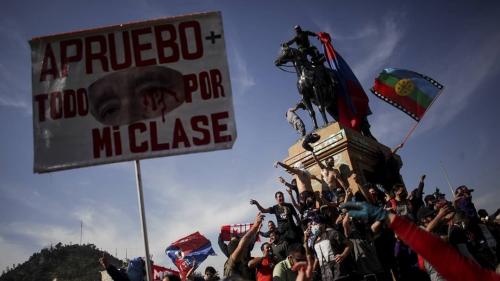Progressive forces win majority of seats in Chile’s Constitutional Convention
Independent candidates from different social movements, trade unions and other popular organizations, won more than a two-thirds majority in the Constitutional Convention, a body responsible for writing Chile’s new constitution
- Opinión

This weekend, on May 15 and 16, over 6 million Chileans participated in the the polls to elect the 155 members of the Constitutional Convention, a body responsible for writing the country’s new constitution. Late last night, Chile’s Electoral Service (SERVEL) published the preliminary results, according to which, the independent and left-wing forces obtained resounding triumphs and won the majority of seats in the Constitutional Convention. Meanwhile, the right-wing forces, who had vowed to block any social reforms in the constitution writing process and were expressly against a new constitution at all, suffered a great defeat.
With 99.13% of the votes counted, the independent candidates from different social movements, trade unions and other popular organizations, who emerged during the social uprising of October 2019, won 48 seats. The “I Approve Dignity” list, made up of left-wing political parties such as Communist Party of Chile, the Broad Front, among other anti-neoliberal parties, won 28 seats. The “Approval” list, consisting of center-left, socially democratic parties secured 25 seats. The “Let’s go for Chile” list, a coalition of right-wing parties including the ruling alliance, obtained 37 seats. The results for the 17 seats reserved for Indigenous communities in the Constitutional Convention will be shared separately later this week.
Along with these elections, regional and municipal elections were held to elect 16 regional governors, 345 mayors and 2,240 municipal councilors for the period 2021-2025. Although the final results of these elections will not be known until the end of the week, the preliminary results indicate a similar blow to the governing coalition, which lost important mayors offices and regional governments. Meanwhile, the left-wing parties retained their municipalities and gained several others across the country, including in the capital Santiago.
According to preliminary results, Rodrigo Mundaca, a prominent social leader and human rights defender, is poised to be the governor of the region of Valparaíso, the second most important region in the country. Similarly, Jorge Sharp of the Broad Front will be re-elected as the mayor of Valparaíso, while Macarena Ripamonti of the Broad Front will become the mayor of Viña del Mar, traditionally dominated by the right-wing, and Daniel Jadue of the Communist Party was re-elected as the mayor of Recoleta.
Chilean President Sebastián Piñera also recognized the overwhelming defeat of the ruling party and the traditional parties in the elections and the dissatisfaction of the population towards them. In his address to the nation, referring to the results, Piñera said today that “the citizens have sent a clear and strong message to the government and also to all traditional political forces. We are not adequately tuning in with the demands and desires of the citizens. We are being challenged by new expressions and leadership” and added that “it is our duty to listen with humility and attention to the message of the people.”
The majority of constituents are clearly in favor of structural changes and against the economic and political model in place for the last five decades. It seems that Chilean society is one step closer to achieving progressive changes and emancipating itself from the current constitution which promotes socioeconomic inequality, which was drafted and imposed in 1980 under the military dictatorship of General Augusto Pinochet (1973-1990).
Chile’s uprising which started with high school students rejecting transportation fare hikes but managed to galvanize the majority of the population, has seen its first electoral manifestation, a ratification for change and broadening of rights for the people.
Del mismo autor
- Will a progressive government in Chile open the door to Bolivian maritime access? 28/03/2022
- Gustavo Petro to run for president in Colombia 16/03/2022
- Maduro announces reactivation of dialogue with the opposition after meeting with US government 10/03/2022
- Assassinations of Colombian social leaders shake communities 03/03/2022
- Outrage in Peru following devastating Repsol oil spill 26/01/2022
- Who are the leading candidates in Chile’s upcoming presidential elections? 12/10/2021
- Salvadorans reject the adoption of Bitcoin as national currency 10/09/2021
- Vaccine access gap widens in Latin America and the Caribbean 25/08/2021
- Haitians protest against international interference 106 years after the US occupation 02/08/2021
- Pedro Castillo takes office as Peru’s new president 30/07/2021
Elecciones
- Zoe Alexandra 27/01/2022
- Aída García Naranjo Morales 22/12/2021
- Francisco Domínguez 21/12/2021
- Fernando de la Cuadra, Aglae Casanova 20/12/2021
- Francisco Domínguez 13/12/2021
